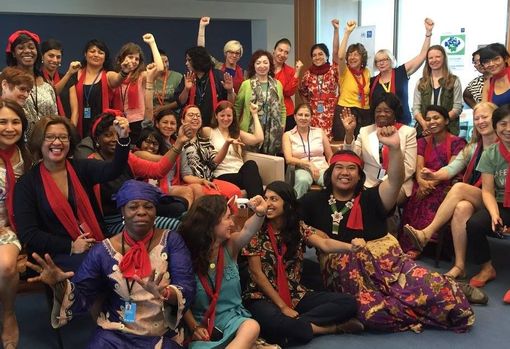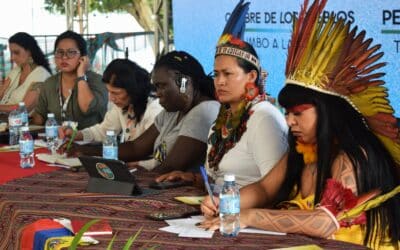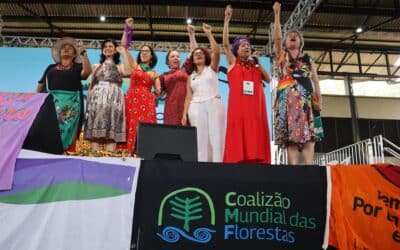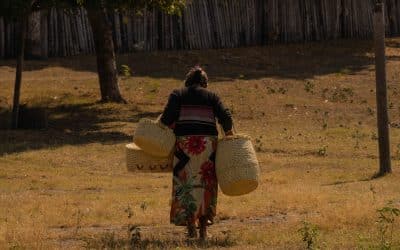21 July, New York: The Women’s Major Group [1], gathered at the United Nations High Level Political Forum (HLPF) [2] that closed today, warning about it failing to address key obstacles to the implementation of the Sustainable Development Goals (SDG) [3]. The HLPF session is the first ever follow up and review process of the SDGs since being agreed upon in September 2015. “The official theme of this years HLPF is ‘ensuring that no one is left behind’, which is positive in itself, but the Secretary Generals report fails to support systemic changes for transformative change”, said Evelyn Ugbe of Women Environmental Program. “Unless key issues like systemic obstacles to development, or lack of meaningful engagement of feminist, women and grassroots organizations are addressed, the 2030 Agenda will become a futile effort,” said Emilia Reyes of Equidad de Genero.
“A first group of 22 countries has volunteered to present their national reviews, in which they describe how they are preparing to implement the 2030 Agenda, in a manner that will “leave no-one behind. An initial survey by the Women’s Major Group of these reports shows that only 2 countries seriously engaged civil society in developing their national SDG plans, and none particularly addressed women’s organizations [4], says Eleanor Blomstrom, of the Women’s Environment and Development Organization. “However, in some of the country presentations at the UN, countries said they wanted to address gender equality (Georgia, Turkey) and recognized the need for the public sector to lead by example with regard to women and girls’ empowerment (Germany)” said Shannon Kowalski of International Women’s Health Coalition, “which shows why women’s rights organisations need to keep up the pressure on their governments”.
“Grassroots organizations risk being reduced to tokenistic consultation instead of being included in national policy development,” said Nurgul Djanaeva of Kyrgyz Forum of Women NGOs. “Women’s organizations can provide valuable lessons on how to implement the SDGs. For example, women play a vital role in conservation and sustainable use of biodiversity in communities. Their knowledge and efforts can help achieve biodiversity conservation targets, like the SDG 15.2 target which aims to end deforestation by 2020,” said Jeanette Sequeira of the Global Forest Coalition.
“Unfortunately, there is a glaring absence of work on systemic barriers and means of implementation in the UN Secretary General’s report and in national reports on the SDGs! Some groups will always be deliberately left behind if we don’t address such systemic drivers of inequality,” said Warda Rina from Asia Pacific Forum on Women, Law and Development who cited examples like neoliberal austerity, free trade and investment policies, militarism and fundamentalism, lack of access to resources like land and glaring inequality of wealth among others.
Women’s rights organizations have been essential in increasing gender equality and getting better legislation adopted, but they face major resource constraints [5]. “Women’s priorities are underrepresented in national plans and budget allocations. Not one of the 22 countries presenting their national reviews said they would start using gender budgeting as committed to in Addis Ababa [6]” said Sascha Gabizon from WECF International, “but some countries have committed that half of their development funding should be gender-responsive, such as France”.
“In the closing session of the HLPF, one country blocked the consensus on the ministerial outcome, calling for a vote to leave out the reference to the Paris Agreement on climate change, with the argument that its lacks ambition and means planned for its implementation. Similarly this applies to the 2030 Agenda, unless we address systemic barriers encapsulated in existing trade, finance and investor protection policies, where short term interests prevail over human rights and the survival of the planet” said Emilia Reyes of Equidad.
The Women’s Major Group jointly with regional and national members and coalitions including the Women2030 program [7] will continue to monitor the national SDG implementation in over 50 countries across five regions to complement the official review process. The Women2030 project will conduct capacity building and support advocacy initiatives to ensure that the SDGs are implemented delivering women’s human rights, gender equality and development justice.
Notes
[1] The “Women’s Major Group” which is the self-organized coalition of over 800 women’s and feminist organizations engaging in the 2030 Agenda policy process recognized by the United Nations see: http://www.womenmajorgroup.org
[2] The High-level Political Forum on Sustainable Development is United Nations central platform for the follow-up and review of the 2030 Agenda for Sustainable Development and the Sustainable Development Goals (SDGs), adopted at the United Nations Sustainable Development Summit on 25 September 2015. See: https://sustainabledevelopment.un.org/hlpf
[3] The UN adopted 17 SDGs in September last year as the next step to the Millennium Development Goals of the last decade, to lay out a universal roadmap to achieving sustainable development by 2030. The SDGs aim to end structural inequalities between countries, between rich and poor and between men and women. The HLPF was created to follow up and review the implementation of the SDGs.
See all SDG goals, targets and indicators at https://sustainabledevelopment.un.org/focussdgs.html
[4] See Women’s Major Group report http://www.womenmajorgroup.org/survey-results-of-the-22-national-hlpf-review-governments-and-civil-society-association-for-national-reviews/
[5] See: http://www.awid.org/news-and-analysis/20-years-shamefully-scarce-funding-feminists-and-womens-rights-movements#sthash.m7CnwqtT.dpuf
[6] See http://www.un.org/esa/ffd/ffd3/press-release/countries-reach-historic-agreement.html
[7] ‘Women 2030’ is a program by an alliance of 5 global women’s alliances working as part of the Women’s Major Group to implement the Sustainable Development Goals (SDGs) in a gender-equitable and climate-just way. They are part of a 5 year partnership agreement with the European Commission called “Women CSOs implementing SDGs Agenda 2030.” See more at: http://bit.ly/29NA4ng
Contact Information
- Sascha Gabizon, WECF International, wecf@wecf.eu +49-172-8637586
- Priscilla Achakpa, Women Environmental Programme, priscilla.achakpa@wepnigeria.net +234-9-2910878
- Jeanette Sequeira, Global Forest Coalition, jeanette.sequeira@globalforestcoalition.org +31617444814
- Kate Lappin, Asia Pacific Forum on Women, Law and Development apwld@apwld.org +66-53-284527
- Nurgul Djanaeva, Kyrgyz Forum of Women NGOs nurguldj@gmail.com
- Shannon Kowalski, International Women’s Health Coalition, skowalski@iwhc.org
- Emilia Reyes, Equidad de Genero, emilia@equidad.org.mx
- Eleanor Blomstrom, Women Environment and Development Organisation WEDO eleanor@wedo.org




